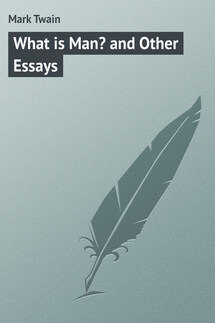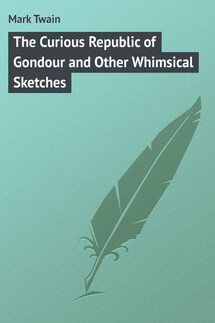Chapters from My Autobiography - страница 18
“Poor little kid!”
A child’s frank envy of the privileges and distinctions of its elders is often a delicately flattering attention and the reverse of unwelcome, but sometimes the envy is not placed where the beneficiary is expecting it to be placed. Once, when Susy was seven, she sat breathlessly absorbed in watching a guest of ours adorn herself for a ball. The lady was charmed by this homage; this mute and gentle admiration; and was happy in it. And when her pretty labors were finished, and she stood at last perfect, unimprovable, clothed like Solomon in all his glory, she paused, confident and expectant, to receive from Susy’s tongue the tribute that was burning in her eyes. Susy drew an envious little sigh and said:
“I wish I could have crooked teeth and spectacles!”
Once, when Susy was six months along in her eighth year, she did something one day in the presence of company, which subjected her to criticism and reproof. Afterward, when she was alone with her mother, as was her custom she reflected a little while over the matter. Then she set up what I think – and what the shade of Burns would think – was a quite good philosophical defence.
“Well, mamma, you know I didn’t see myself, and so I couldn’t know how it looked.”
In homes where the near friends and visitors are mainly literary people – lawyers, judges, professors and clergymen – the children’s ears become early familiarized with wide vocabularies. It is natural for them to pick up any words that fall in their way; it is natural for them to pick up big and little ones indiscriminately; it is natural for them to use without fear any word that comes to their net, no matter how formidable it may be as to size. As a result, their talk is a curious and funny musketry clatter of little words, interrupted at intervals by the heavy artillery crash of a word of such imposing sound and size that it seems to shake the ground and rattle the windows. Sometimes the child gets a wrong idea of a word which it has picked up by chance, and attaches to it a meaning which impairs its usefulness – but this does not happen as often as one might expect it would. Indeed, it happens with an infrequency which may be regarded as remarkable. As a child, Susy had good fortune with her large words, and she employed many of them. She made no more than her fair share of mistakes. Once when she thought something very funny was going to happen (but it didn’t), she was racked and torn with laughter, by anticipation. But, apparently, she still felt sure of her position, for she said, “If it had happened, I should have been transformed [transported] with glee.”
And earlier, when she was a little maid of five years, she informed a visitor that she had been in a church only once, and that was the time when Clara was “crucified” [christened]….
In Heidelberg, when Susy was six, she noticed that the Schloss gardens were populous with snails creeping all about everywhere. One day she found a new dish on her table and inquired concerning it, and learned that it was made of snails. She was awed and impressed, and said:
“Wild ones, mamma?”
She was thoughtful and considerate of others – an acquired quality, no doubt. No one seems to be born with it. One hot day, at home in Hartford, when she was a little child, her mother borrowed her fan several times (a Japanese one, value five cents), refreshed herself with it a moment or two, then handed it back with a word of thanks. Susy knew her mother would use the fan all the time if she could do it without putting a deprivation upon its owner. She also knew that her mother could not be persuaded to do that. A relief most be devised somehow; Susy devised it. She got five cents out of her money-box and carried it to Patrick, and asked him to take it down-town (a mile and a half) and buy a Japanese fan and bring it home. He did it – and thus thoughtfully and delicately was the exigency met and the mother’s comfort secured. It is to the child’s credit that she did not save herself expense by bringing down another and more costly kind of fan from up-stairs, but was content to act upon the impression that her mother desired the Japanese kind – content to accomplish the desire and stop with that, without troubling about the wisdom or unwisdom of it.









